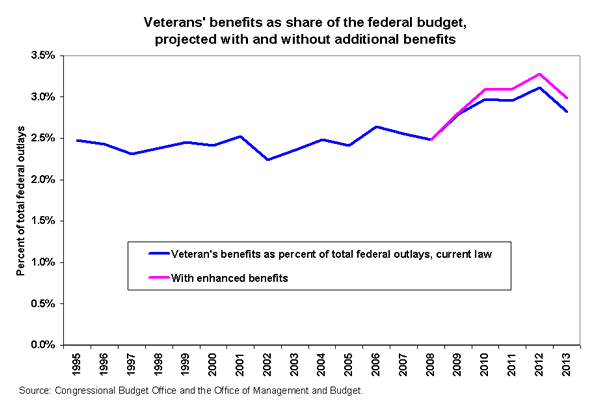See Snapshots archive.
Snapshot for May 21, 2008.
The 21st Century G.I. Bill and short-sighted “deficit hawks”
by L. Josh Bivens and Lauren Marra
Recent legislation introduced to allow veterans’ educational benefits to keep pace with the rising cost of higher education (the 21st Century G.I. Bill) has recently been opposed by lawmakers citing concerns about the federal budget deficit.1
This is a classic example of Beltway budget myopia. Higher education benefits for veterans have generally been found to provide huge returns, making them an excellent investment in strictly economic terms, even if they have to be financed through borrowing.2
Furthermore, the proposed benefit expansion would have an imperceptible effect on the federal budget deficit. The chart below shows the share of the federal budget devoted to veterans’ benefits and services, including projections from the Office of Management and Budget, through 2013. It also shows the effects of the enhanced educational benefits, using a cost estimate from the Congressional Budget Office. Essentially, the proposed increase would push up veterans’ benefits as a share of total federal outlays by 0.15%.
The federal government spent roughly $8,560 on each member of the U.S. population in 2007. If the enhanced veterans’ benefits currently under debate had been in effect, this would have added only about $12 to this total. Blocking these hugely valuable benefits on the grounds of deficit hawkishness makes no economic sense.
Notes
1. “Blue Dogs Urged To Stay Firm On Pushing For G.I. Bill Offsets.” Congress Daily. May 13, 2005.
2. See Bound and Turner (2002), “Going to War and Going to College: Did World War II and the G.I. Bill Increase Educational Attainment for Returning Veterans?” Journal of Labor Economics, Volume 20(4).

